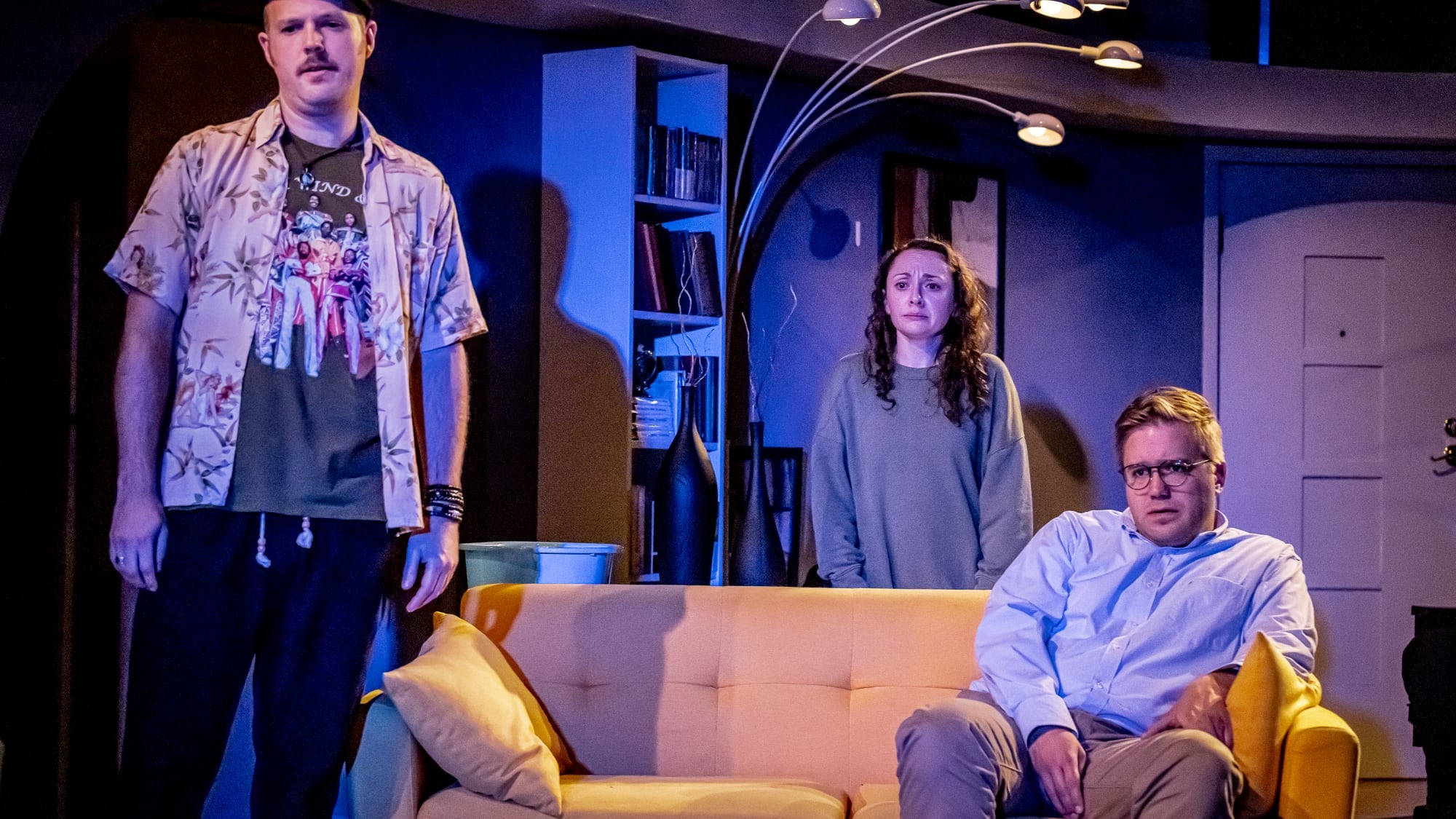Recent Tragic Events is a play about 9/11, which at first glance seems an odd choice. Craig Wright’s story is 20 years old and staged as a period piece. But as it unfolds, it becomes clear that the play—which opened theater company Third Rail Repertory Theatre’s first season two decades ago—is both a reflection on our past and a (sometimes strangely) prescient mirror of other, more recent tragic events. Recent Tragic Events wraps its run this week at CoHo Theatre. Freedom isn’t free, but it would be tragic to use that freedom to miss Third Rail’s closing performances.
Wright’s tale takes place on Sept. 12, 2001, centering on Waverly (Emily Eisele), who is desperately trying to contact her twin sister who lives in New York. Waverly’s blind date, Andrew (Ben Tissell), tries to decide whether the two of them are destined to be together or doomed because of a secret he eventually reveals just before the play’s conclusion. In the second act, author Joyce Carol Oates appears as a sock puppet voiced and operated by Rose Proctor, who is simultaneously appearing in her own body onstage as the mostly silent, pantsless character Nancy. Oates debates with Waverly’s neighbor Ron (Rolland Walsh) whether the “recent tragic events” were inevitable, if America was (or still is) fated to catastrophe.
The play’s meta-theatricality challenges our ideas of free will versus destiny. Before the show, a stage manager has someone in the audience flip a coin, which she says will determine what happens in the play. That idea gets torn apart, however, when the second act starts. The stage manager returns and says, “I’m an actor, and this is a play” (oh hello, Our Town). She reminds us that the actors onstage are puppets, controlled by words on the page. It might seem hokey if you’ve forgotten how much society called fate into question during the fall of 2001 (assuming you were old enough to remember).
Wright attended the Nov. 8 performance, taking part in a discussion with Third Rail’s managing artistic director, Maureen Porter, and founding artistic director Scott Yarbrough, who directed both this and the inaugural run of Recent Tragic Events. Wright, who also wrote for Six Feet Under and Lost, spoke about fate versus freedom, the play’s central question, but also how the shadow of 9/11 loomed large over the rest of the 2000s.
“Serendipity and synchronicity only exist to the people who are experiencing it because they’re there to notice,” Wright said. “But the universe, or whoever is whispering in our ear, is trying to get us to connect.” If the play were real, we could wonder if the characters are brought together by randomness, God or some other magical magnetism. But we know, because it is a play, that the characters exist to tell us something the production wants us to understand.
An audience member asked director Yarbrough about the differences between the original production and this one. He said it came down to working with the cast’s individuals, incorporating what they brought to the performance. While he was tempted to take us to the present day at the end of the play when Ron finally turns off the incessant TV, Yarbrough said he felt it was a stronger choice to focus on the characters and their story, a choice which prevented the feeling that they were heavy-handedly pointing at the news and saying, “See! It’s all connected!”
The play, to put it bluntly, is at times a bummer, and the ending feels inevitable. However, the actors embody their characters (puppet included) with so much realistic nuance and empathy it’s easy to forget they aren’t real people, and that the ending has been set for nearly a quarter century. You root for the happy ending, even when you know—because these are real tragic events—that you’re holding out hope against the odds. But because of how Wright weaves the characters’ stories together and how the production brings us into the intimate space, the message is ultimately optimistic: Bad stuff happens, sometimes for no reason, and all we can do is show up for one another when it does.
Meanwhile, in the real world (or as real as the online world gets), Oates regularly goes viral for her takedowns of political figures, including Twitter ruiner Elon Musk and—in the wake of Jeffrey Epstein’s emails that came to light this week—anyone involved with Epstein, whose death she refers to as the “immense putrescent elephant corpse in the room.” If synchronicity is real, it’s happening this week. Between the Third Rail’s anniversary, current events, and the apparently unshakable ubiquity of Joyce Carol Oates, it’s hard not to believe in patterns beyond common perception after watching Recent Tragic Events.
SEE IT: Recent Tragic Events by Third Rail Repertory Theatre at CoHo Theatre, 2257 NW Raleigh St., 503-235-1101, thirdrailrep.org. 7:30 pm Wednesday–Saturday, 2 pm Sunday, Nov. 19–23. $16.50–$58.50.

